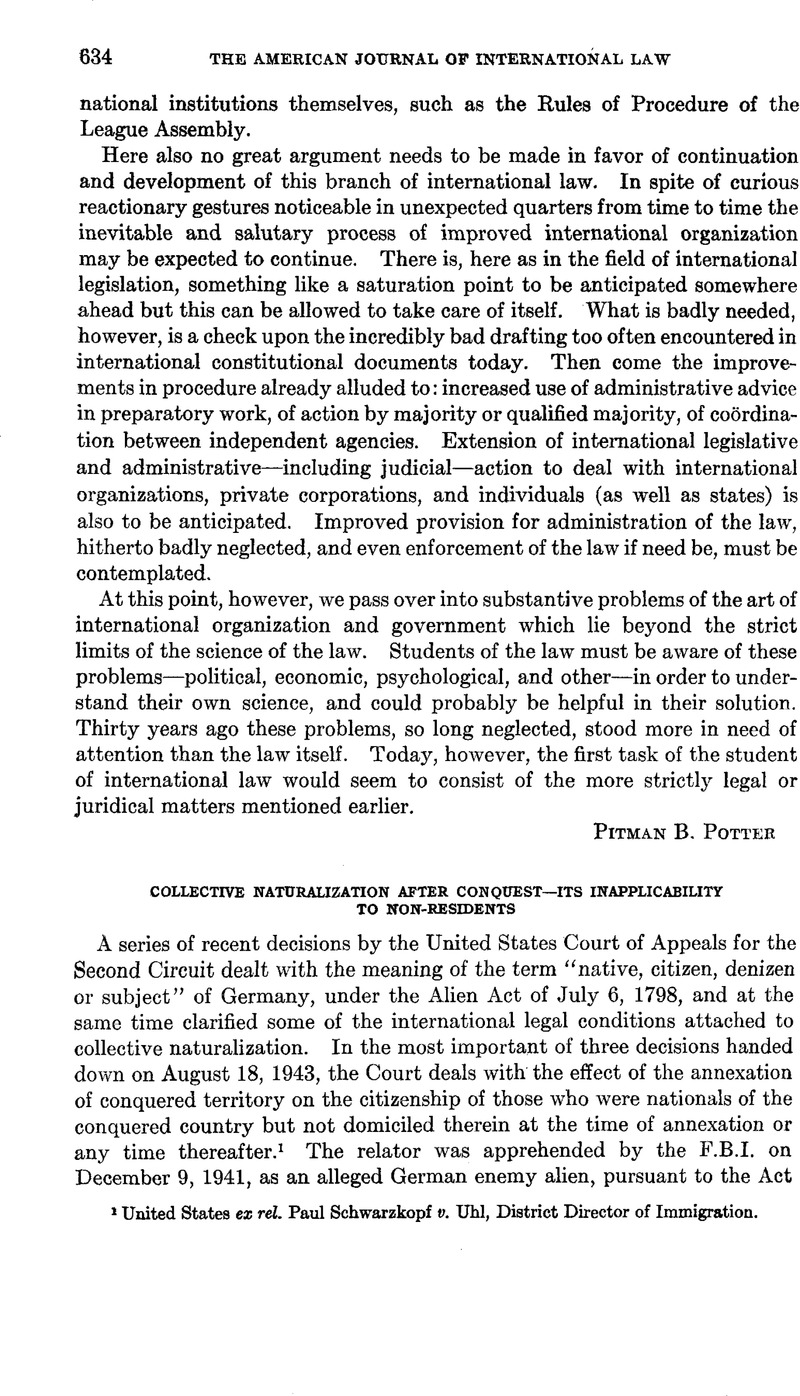Published online by Cambridge University Press: 12 April 2017

1 United States ex rel. Paul Schwarzkopf v. Uhl, District Director of Immigration.
2 50 U.S.C.A. § 21. This section reads:
Section 21. Restraint, regulation, and removal. Whenever there is a declared war between the United States and any foreign nation or government, or any invasion or predatory incursion is perpetrated, attempted, or threatened against the territory of the United States by any foreign nation or government, and the President makes public proclamation of the event, all natives, citizens, denizens, or subjects of the hostile nation or government, being of the age of fourteen years and upward, who shall be within the United States and not actually naturalized, shall be liable to be apprehended, restrained, secured, and removed as alien enemies.
3 6 Fed. Reg. 6323.
4 As in United States v. Repentigny, 5 Wall. 211 (U. S. 1866); Jones v. McMasters, 20 How. 8 (U. S. 1857); Boyd v. Thayer, 143 U. S. 135 (1892).
5 Early decisions to this effect are: McIlvaine v. Coxe’s Lessee, 2 Cranch 280, 4 Cranch 209 (U. S. 1805); Respublica v. Chapman, 1 DaU. 53 (U. S. 1781); Inglis v. Trustees of Sailor’s Snug Harbour, 3 Pet. 99, 122, 123 (U. S. 1830); Kent, Commentaries, Vol. II, §§ 40, 41.
6 Said Marshall, J. in American Ins. Co. v. 356 Bales of Cotton (Canter), 1 Pet. 511, 542 (U. S. 1828): “On such transfer of territory, it has never been held, that the relations of the inhabitants with each other undergo any change. Their relations with their former sovereign are dissolved. . . . The same Act which transfers their country, transfers the allegiance of those who remain in it.” (Italics supplied.) Halleck adds that “the allegiance of those who do not remain, of course, is not so transferred with the territory.” (International Law, 4th ed., Vol. II, p. 509). The American diplomatic practice is in accord with this view. See Moore’s Digest of International Law, §§ 379, 380, and Van Dyne, Naturalization, pp. 275–276.
7 International Law, 5th ed., by Lauterpacht, London, 1937, Vol. I, § 240.
8 Droit International, Vol. II, p. 438.
9 International Law, 4th ed., (London 1908), Vol. II, p. 506 et seq., at p. 511.
10 See also Brown v. United States, 5 Ct. CI. 571, 573 (1869), in which the same annexation was involved. Brown was a native of Hanover, domiciled in Savannah, Georgia, since 1860. To maintain his suit in the Court of Claims, he had to prove that he was a citizen of a government which permits American citizens to bring suit against it. He offered evidence that Prussia accorded such a privilege. Nott, J. remarked that merger of territory carries even absent subjects with it, since the tie which carries them to the new state is not bodily presence but allegiance. This is about the only American authority that believes election or assent, express or tacit, is not material. But Brown was asserting that he was a subject of Prussia, and Prussia (or the United States) was not seeking to force on him an allegiance which he repudiated, as in the Schwarzkopf case.
11 In Strupp, Wörterbuch des Völkerrechts, Vol. II, p. 271 (1927). Cf. Kunz, J., Die völkerrechtliche Option, Breslau, 1925, Vol. I, pp. 100–110.
12 Holtzendorff in Handbuch des Vdlkerrechts, Berlin, i885, Vol. II, pp. 42–43. Stoerk, Option und Plebiscit, bei Eroberungen und Gebietscessionen, Leipzig, 1879, pp. 150–155.
13 Über den Einfluss der Einverleibungen auf das Unterthanenverhältniss, Allgemeine Deutsche Strafrechtszeitung, Vol. VIII, pp. 304–320 (1868), opinions summarized by Halleck, op. cit. Vol. II, p. 510.
14 Cf. Hula, , “National Self-Determination Reconsidered,” in Social Research, Vol. 10, Feb. 1943, pp. 1–21 Google Scholar.
15 United States ex rel. Ivan J. Zdunic v. Uhl.
16 United States ex rel. Frederic Wakler D’Esquiva v. Uhl.